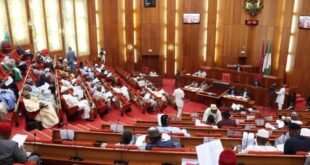By Victor Osula, Abuja
The Executive Committee of the International Monetary Fund has concluded the consultation of article IV of 2025 with Nigeria, praising the country’s monetary and tax authorities for the implementation of vast reforms in the last two years.
In a declaration issued by Washington, DC, Wednesday 2 July, the IMF observed that the reforms contributed to stabilizing the macroeconomic environment of Nigeria, support resilience and restore the trust of investors.
The fund stated that the central bank of Nigeria (CBN) was adequately maintaining a position of monetary policy and urged the continuation of these measures until the disinflation is firmly anchored. He welcomed the reapbiusization in the banks and efforts to strengthen financial inclusion and deepen the participation in the capital market.
The administrators also encouraged the adoption of a solid surveillance framework based on the risk for mortgage loans and consumers, as well as for the Fintech and cryptographic sectors. The IMF has applauded the work of the authorities to improve the anti -market framework and contrast the terrorism financing framework (AML/CFT) and underlined the need to promptly face the remaining gaps to exit the gray list of financial action (Fatf).
From a monetary point of view, the IMF praised the end of the monetization of the deficit and the steps towards the strengthening of the governance of central banks as fundamental to establish an institutional framework for targeting for inflation.
The report observed that the CBN reforms in the change market have improved the discovery and liquidity of prices. It requested the development of a strong FX intervention framework to manage excessive volatility, describing the exchange rate as a vital shock absorber.
“The Nigerian authorities have implemented important reforms in the last two years, improving macroeconomic stability and improving resilience. They have removed expensive subsidies for fuel, having stopped the monetary deficit financing and improved the functioning of the FX market,” says the report.
As a result, the trust of the investors has returned, allowing Nigeria to draw on the Eurobond market and attract renewed wallet affluent. The IMF said that the growth of GDP is accelerated at 3.4% in 2024, largely led by the increase in oil production and by a vibrant service sector. However, he observed that agriculture remained submissive due to the challenges of the safety and decrease in productivity.
The fund provides that Nigeria’s royal GDP will grow by 3.4% in 2025, supported by greater internal refining capacity, greater oil production and a growth supported in services. Medium -term growth is expected to be on average of about 3%, supported by the current structural reforms.
The IMF also observed that gross and clear international reserves increased in 2024, led by a strong current account surplus and by improved wallet affluents. The reforms in the FX market contributed to stabilizing the Naira, while the improvements of food production contributed to reducing inflation to 23.7% in April 2025, down by an average of 31% in 2024, based on the CPI index rebelled at the bottom of the National Bureau of Statistics.
Inflation will continue to decrease in the medium -term, supported by narrow macroeconomic policies and an early reduction in retail fuel prices.
On the tax front, the IMF observed an improvement in 2024, led by the earnings of revenue related to the exchange rate, by the administration of improved revenue and the highest grants, which have compensated for the increase in interests and general costs.
However, he warned that the reduction risks grew in global uncertainty. A drop in oil prices or the increase in financing costs could have a negative impact on growth, tax performance and external stability. Insecurity also remains a serious threat to growth and food offer.
While recognizing that the benefits of the reforms have yet to reach all the Nigerians, the IMF has solicited agile politicians to protect macroeconomic earnings, reduce poverty and increase inclusive growth. He also recommended the gradual removal of the management of the capital flow management in an adequately sequenced way.
The report provided for a neutral tax position that gives priority to investments that improve growth and faster implementation of social security networks, including cash transfers to vulnerable groups.
The IMF directors further praised the progress on the tax reform, describing it as a key step to improve the mobilization of revenue and create tax space for development without compromising the sustainability of the debt.
To improve the long -term growth potential of Nigeria, the report underlined the need to deal with safety problems, reduce bureaucratic bureaucracy, improve agricultural productivity, close infrastructure gaps, in particular in electricity and increase investments in health, education and climatic resilience.
The directors also underlined the importance of removing structural barriers to the growth of credit in the private sector and improving the quality of data for the actual heritage based on evidence.
Post views:
89
 JamzNG Latest News, Gist, Entertainment in Nigeria
JamzNG Latest News, Gist, Entertainment in Nigeria









